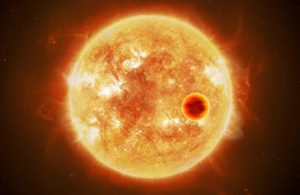
A hot exoplanet. Image credit: ESA/ATG medialab
April saw Liverpool host the European Week of Astronomy and Space Science, from which there were a many new developments and discoveries, a few of which we discuss this month. The conference came just days after the NASA and ESA made the announcement that the largest astronomy project in recent times, the James Webb Space Telescope, will be delayed. Its launch has been pushed back from the (already-delayed) 2019 to 2020.
In more cheery news, NASA’s TESS satellite was successfully launched, with an aim of discovering thousands of new exoplanets. Meanwhile, ESA selected ARIEL to be launched in just over a decade. With a goal of characterising the atmospheres of exoplanets, Ariel will revolutionise our understanding of these alien worlds. To find our more about TESS, Ariel and other current and future exoplanet missions, I spoke to Dr Subi Sarkar, based here in Cardiff University.
An extended edition of an original broadcast on 25th April 2018 as part of Pythagoras’ Trousers on Radio Cardiff.
Don’t forget you can now subscribe to the podcast. For an archive of Pythagorean Astronomy, visit pythagastro.uk.





